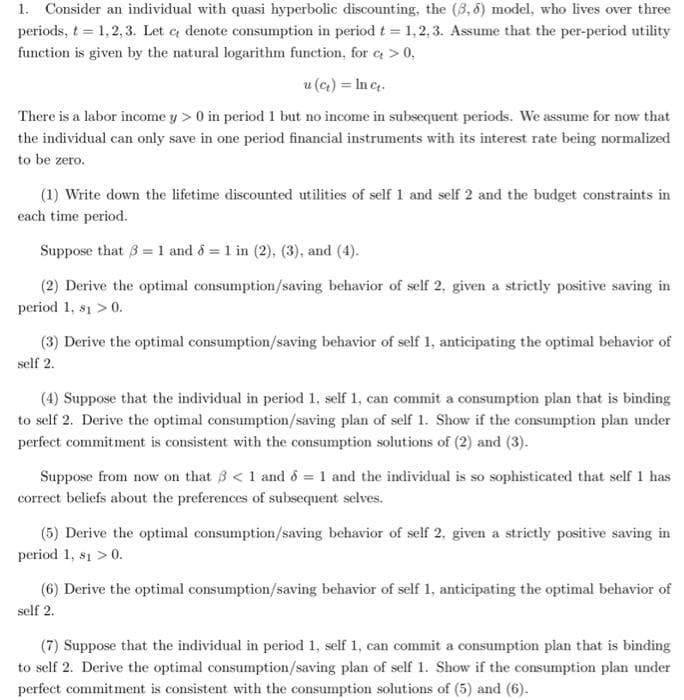Chapter2: Mathematics For Microeconomics
Section: Chapter Questions
Problem 2.14P
Related questions
Question

Transcribed Image Text:1. Consider an individual with quasi hyperbolic discounting, the (8,6) model, who lives over three
periods, t= 1,2,3. Let e denote consumption in period t = 1,2,3. Assume that the per-period utility
function is given by the natural logarithm function, for c>0,
u (c₂) = Inc.
There is a labor income y> 0 in period 1 but no income in subsequent periods. We assume for now that
the individual can only save in one period financial instruments with its interest rate being normalized
to be zero.
(1) Write down the lifetime discounted utilities of self 1 and self 2 and the budget constraints in
each time period.
Suppose that 3= 1 and 6 = 1 in (2), (3), and (4).
(2) Derive the optimal consumption/saving behavior of self 2, given a strictly positive saving in
period 1, 81 > 0.
(3) Derive the optimal consumption/saving behavior of self 1, anticipating the optimal behavior of
self 2.
(4) Suppose that the individual in period 1, self 1, can commit a consumption plan that is binding
to self 2. Derive the optimal consumption/saving plan of self 1. Show if the consumption plan under
perfect commitment is consistent with the consumption solutions of (2) and (3).
Suppose from now on that < 1 and 6 = 1 and the individual is so sophisticated that self 1 has
correct beliefs about the preferences of subsequent selves.
(5) Derive the optimal consumption/saving behavior of self 2, given a strictly positive saving in
period 1, $1 > 0.
(6) Derive the optimal consumption/saving behavior of self 1, anticipating the optimal behavior of
self 2.
(7) Suppose that the individual in period 1, self 1, can commit a consumption plan that is binding
to self 2. Derive the optimal consumption/saving plan of self 1. Show if the consumption plan under
perfect commitment is consistent with the consumption solutions of (5) and (6).
Expert Solution
This question has been solved!
Explore an expertly crafted, step-by-step solution for a thorough understanding of key concepts.
Step by step
Solved in 5 steps with 77 images

Knowledge Booster
Learn more about
Need a deep-dive on the concept behind this application? Look no further. Learn more about this topic, economics and related others by exploring similar questions and additional content below.Recommended textbooks for you

